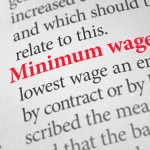A 53 Week Payroll Year! – WHAT?
That’s a blog title that I would imagine has many people scratching their heads!
The blog could easily have been entitled ‘A 27 Fortnight Payroll Year’ which is no less confusing. So let’s first look at how this might happen.
My example is an employee that’s paid every Friday. Looking at the 2018/19 tax year, the first day of the new financial year on the 6th April was a Friday, so we pay our employee. That is ‘Week 1’ payroll.
We carry on processing payroll throughout the year every Friday, and ‘Week 52’ is Friday 29th of March. So we pay our employee.
But there is one more Friday left before the end of the financial year, Friday 5th April. And we need to pay our employee. This is where that very odd ’Week 53’ occurs.
So how is this managed? HMRC advise that payroll is run, and we process Week 53 as if it were Week 1. So a non-taxable element is allowed against the earnings, and we process as we usually would. Most payroll software manages this, and as a small employer or company you wouldn’t have to do anything different to make this happen. In fact you may not even notice it.
Impact on the Employer
At this stage, none. Payroll will be run and the FPS submitted to HMRC in the usual way. The employee will receive a payment that has a tax and NI deduction that is in keeping with their expectations and the ‘Week 53’ payroll will become part of the Month 12 or Quarter 4 PAYE liability total that will need to be paid over to HMRC by the 22nd of April.
Impact on the Employee
Now, this is where it gets interesting! By week 52 the employee will have received all of the non-taxable allowance that they are entitled to as defined by their tax code. However in week 53 they will have received pay which has been processed with a non-taxable element. HMRC require that this is how employers operate a ‘Week 53’ payroll but what it does mean is that the employee hasn’t paid enough tax as they have used all of their non-taxable allowance. Theoretically they should have paid 20% tax on all of the week 53 earnings. The employee will likely received a letter from HMRC called a P800. This has the scary heading of:
‘Tax calculation letter for the year 6th April 2018 to 5th April 2019. You have paid too little tax. You owe HMRC £…’
By the time most employees have got to the pound sign they’re stopped seeing what they’re reading and they’ve started to panic!
And the next thing that happens is that the above statement about this not having an impact on the employer changes. You may now receive a panicked phone call from the employee asking how payroll is wrong and why they owe tax.
Breathe out!
It’s not the easiest concept to explain to a non-payroll savvy person, but if you tell your employee that there was an extra week in the year, (53 instead of 52) they have had all of their tax code applied up to week 52 and are liable to pay 20% tax on all of the last weeks earnings. HMRC ask employers to process week 53 like any other week, and HMRC then contact the employee about the bit of unpaid tax on Week 53.
How Do HMRC Resolve This?
Their solution to the underpayment of tax is to make an amendment to the tax code of the employee in a future year. Their current plan is to make the change in 2020-21 so the employee has a small amount owing to HMRC for 12 months, and then repays the amount over 12 months via PAYE.
My Opinion on This Process
Do I like it? No! The employee can panic and it can cause upset and mistrust between employee and employer. In my case it can cause mistrust between me and my clients.
Because of the way 2018-19 fell, with the first day of the financial year being a Friday, you’re guaranteed to have this happen to employees, (or in my case clients) that pay their employees weekly on Fridays, and in some cases fortnightly. HMRC are currently sprinkling P800’s around like fairy dust so if you are a small employer that pays weekly or fortnightly and your first payday of the financial year in 2018/19 was Friday 6th April, you may find yourself in this situation.
As a small employer running your own payroll you may find yourself struggling with this if it’s the first time you’re encountered it and it can be a concern. But unless there’s something else that has gone wrong you can be assured of the following:
The HMRC Letter is Correct, Payroll is Correct and the Employee has been Paid Correctly
But these are the kind of quirky things within payroll that can cause small employers sleepless nights and fruitless hours on the phone to HMRC to find out what’s happened. Payroll is becoming more and more complex with auto enrolment, payrolling benefits and rules around holiday entitlement and minimum wage. I know small employers don’t have time (or the will) to get to grips with the finer points of holiday accrual. And frankly I would like to think that small employers have more exciting things to do.
PayrollAbility is always here. We’re just a call away with help and advice, and with payroll starting at £18.50 per month it’s an affordable way to sleep at night and avoid spending free time reading about Workplace Pensions or other exciting topics. I’m sure you’d rather be in the summer sun, out with friends and family or walking the dog.
So call us today to see how we can help you.





